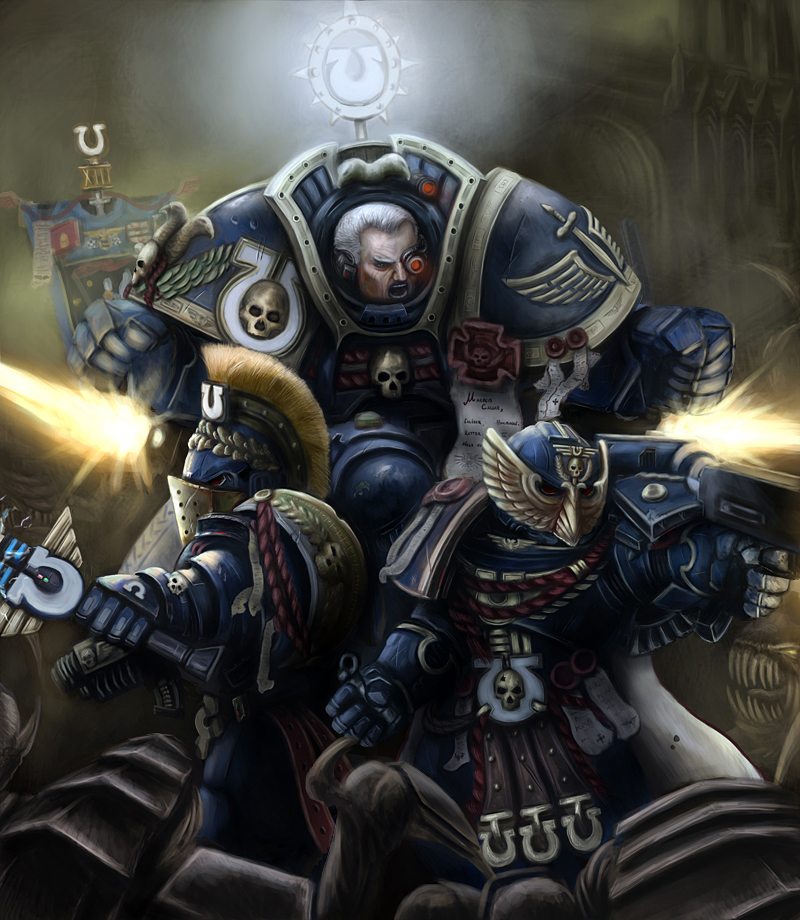A space marine of a traitor legion has a much more morally complex decision to make. The Emperor, the Primarchs, the Warmaster, and the Chaos Gods all make competing claims to a space marine's loyalty. Which source of authority is most legitimate?
Here are the potential arguments:
1. Divinity
This argument posits that one should follow the authority figure because the authority figure is divine. The chaos gods have the strongest argument in this respect, insofar as they represent fundamental truths about the universe and are eternal. The Emperor does not actively make this argument for himself, but his followers nevertheless make this argument for him by reasoning that if there is a shadow then there must be a light and that only a true divinity denies his god like nature. The Primarchs' claim to divinity is also present, but in most cases these claims are subsumed even in the case of demon prince Primarchs under the shadow of the chaos gods or the Emperor.
2. Exceptionality
This argument is based on the idea that the authority figure at question deserves loyalty, because he is exceptional. For example even if the Emperor is not divine he is very powerful and special so therefore he should have the right to rule.
3. Fate
A space marine may be predestined to follow an authority figure because it is his predetermined fate to do so or because obedience to this power is somehow embedded in their internal makings. Most space marines are of course designed to naturally follow and obey their Primarch. At certain points members of the Word Bearers question whether qualities of blind loyalty are an inherent part of their gene seed. The Night Haunter also questions whether the Emperor created him predestined to suffer a bleak life.
4. Natural Order
The basis of this argument is that space marines are essentially soldiers and follow the natural chain of command. The Warmaster has command over the Primarchs but the Emperor has command over the Warmaster. This implies that a Space Marine should ultimately follow the Emperor. However, the Emperor himself may be trying to upset the natural order by attempting become a deity, which would be a betrayal of his own ideals.
4. Personal Benefit or Purpose
The argument here is that a space marine will personally benefit or fulfill his purpose should his side triumph. This could be as simple as material or spiritual rewards, or perhaps the space marine is aware that some greater truth such as that once the galaxy has been conquered for the Emperor that there will be no need for space marines anymore. In the case of the EC, they believe that following chaos will allow them to achieve greater perfection.
5. Punishment
A space marine could follow an authority figure out of awareness that he might be punished if he does not. It is heavily implied that two Primarchs and their legions have already been destroyed by the Emperor.
6. The Greater Good
The space marine may believe that following the authority figure is for the greater good of all or to prevent some great harm or injustice from occurring. For example, one may follow the chaos gods because one believes that victory of chaos is inevitable and this is humanity's only hope or because one believes that Horus will ultimately destroy himself and chaos if he triumphs.
7. Code of Honor / Loyalty
A space marine may follow an authority figure because it is his code of honor or tradition to do so, even if his personal feelings may even be to the contrary.
8. Consent
A space marine may decide of his own free will to consent to follow the authority figure.


No comments:
Post a Comment